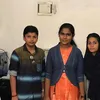How this community in a remote village of Arunachal Pradesh is instilling good values in children
From waste management and organic farming to building eco-friendly houses, the Jhamtse Gatsal community, founded by Lobsang Phuntsok, is helping children understand the values of conserving the environment.
Whether education is a right or a privilege has been one of the most debatable topics.
According to a report by the Unesco, around 900 million globally people cannot read or write, and 287 million or 37 percent of that population is Indian. This shows that most of the country's population, despite education being a fundamental right of every citizen, do not have access to basic education.
While we think of solutions to fix this problem, the Jhamtse Gatsal community in the remote village of Mago, Arunachal Pradesh, is creating a holistic environment for children.
Founded by Lobsang Phuntsok in 2006, the community creates and instils the value of humanity in children, and provides them with free education as well.

Lobsang Phuntsok (Image: Efforts For Good)
The community has various projects like Project Earth, an initiative undertaken by the students of class 6 to 12 to achieve a zero-waste community. As per Efforts For Good, on the last Saturday of every month, all the members of the community gather and further divide themselves into a group.
These groups undertake deep cleaning of all their surrounding areas by following the 4R method - recover, reuse, reduce, and recycle. The project basically aims to bring down the amount of waste being disposed of by burning, along with creating awareness among the people.
With its continued efforts, the community has drawn the attention of politicians as well. Earlier this year, Chief Minister Pema Khandu visited the community. Witnessing the zeal and enthusiasm of students, he said,
“It’s a great pleasure to visit Jhamtse Gatsal, also known as “garden of love and compassion”, which is the first of its kind in India where children are taught to be good human beings,” reports Arunachal 24.

Students are provided with best resources to study (Image: Efforts For Good)
Unlike schools across India, this community has designed its very own curriculum, which encourages practices like design thinking, differentiation, multiple intelligence, presentations, mind mapping, and reciprocal reading.
Besides education, the community looks after the health and nutrition of its students. The community also follows organic farming to grow vegetables and fruits.
Now, the community has started the construction of eco-friendly houses made of mud, cob, and straw. Till now, it has constructed two cob houses and has adopted rainwater harvesting, which harnesses the heavy downpour, and provides uninterrupted water supply. By using clean and renewable energy, the community meets 80 percent of its energy needs.
Do you have an interesting story to share? Please write to us at [email protected].To stay updated with more positive news, please connect with us on Facebook and Twitter.









